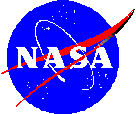|
National Aeronautics and Space Administration
John F. Kennedy Space Center Kennedy Space Center, Florida 32899 AC 321-867-2468 ___________________________________________________________________________________________________________ For Release: Nov. 7, 2003
Bruce Buckingham Kennedy Space Center, Fla. (321) 867-2468
RELEASE: 91 - 03
NASA-KSC ENGINEER RECEIVES R&D 100 AWARD FOR NEW INSULATION TECHNOLOGY
James Fesmire, NASA lead engineer of the Cryogenics Testbed Facility at Kennedy Space Center, received the R&D 100 Award for his work on a new product, "Flexible Aerogel Superinsulation," a composite insulation blanket. R&D (formerly Research & Development) named Fesmire an innovator and the product "one of the most technologically significant of the year."
Fesmire received the R&D 100 Award during the 41st annual awards ceremony last month in Chicago, Ill., for his pioneering idea in thermal insulation. KSC Deputy Director Dr. Woodrow Whitlow attended the event as Aspen Aerogels, Inc. of Marlborough, Mass., and NASA-KSC jointly received the award. R&D recognizes the efforts of the best scientists and engineers in industry, government, and academic research laboratories.
"It is truly an exceptional achievement for the Center, and for James' work to be chosen as one of the top innovations of the year. With so many outstanding individuals around the world making breakthroughs each year, most researchers never earn this recognition," said Whitlow.
Fesmire, a KSC employee for over 20 years, started research in advanced insulation technology in 1992 when he first learned about monolithic solid aerogels-commonly referred to as "frozen smoke." His investigation into the technology led him to believe that a durable and flexible composite aerogel material could be designed while retaining the excellent thermal insulating properties similar to the solid type.
-more-
-2-
After writing a NASA Small Business Innovation Research program solicitation in 1992, which was awarded to Aspen Systems, Inc. in 1993, Fesmire worked with the company's principal investigator Dr. Jae Ryu to make the first prototype blanket materials. Led by company president Dr. Kang Lee, Aspen Systems has since developed breakthrough advances in manufacturing technology for aerogel production.
The new technology is the result of more than 10 years of research and development work, said Fesmire. "And this thermal insulation product is just the beginning. This superinsulation is a major breakthrough for energy efficiency standards in industry and gives dramatic new possibilities for thermal protection systems on space launch vehicles.
"It is an outstanding candidate material for the next generation of launch vehicles and launch site equipment," Fesmire continued. "As a blanket material, it is one of the world's best thermal insulators."
The blanket material is being investigated for advanced space suits, crew cabin protection, the Space Shuttle, and a number of other NASA applications.
Aspen Aerogel, a spinoff company formed in 2001, has a standard product line that includes three types of blanket insulation to cover a wide range of temperatures. Applications include textiles and apparel, oil and gas industry, manufacturing, transportation, refrigeration, and more.
For additional information on the Flexible Aerogel Superinsulation go to: www.aerogel.com
For information on other KSC technology success stories, visit:
http://technology.ksc.nasa.gov/WWWaccess/Stories/success_stories.html
-end- |

